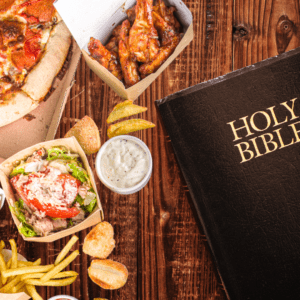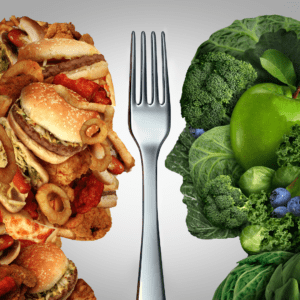The Bible has many verses about food and its importance in our lives. In the Bible, we can find Bible verses about food that talks about God providing us with food, the joy of gathering around a meal, and how it serves us in times of need. Food is a powerful symbol throughout scripture, representing nourishment, provision, and fellowship with others. Whether you’re looking for inspiration or encouragement related to food, these Bible verses will offer insight and guidance.
Food in the Bible

As food is an essential part of life, it comes as no surprise that it is frequently mentioned in the Bible. Food provides sustenance and can also bring people together in fellowship and celebration. Throughout scripture, food is used to illustrate various themes, such as generosity, provision, and hospitality.
The Bible not only speaks about different types of food but also includes instructions for what foods should be eaten or avoided. Dietary laws are among the most detailed sections in Leviticus and Deuteronomy. Both outline clean and unclean animals as well as cooking methods for acceptable foods. In addition, certain feasts were also celebrated throughout the year with specific foods associated with them. Foods including unleavened bread for Passover or grain offerings from harvest time.
Food was often used by God to demonstrate His provision to those who followed Him faithfully.
Spiritual Meaning of Food
Food has always been a part of spirituality, from the ancient days of the bible to modern times. In the bible, food is used as a symbol for spiritual sustenance and is essential to both physical and spiritual life. Eating was much more than just filling one’s stomach in biblical times; it often represented fellowship, holiness, and nourishment.
The Bible is replete with references to food as a symbol of faith and joy, such as when Jesus turned water into wine at the wedding feast in Cana or when God told Moses that manna would be provided for his people during their time in the wilderness. Food was also used as a sign of divine blessing—Abraham gave bread and wine to three angels who appeared before him—and it was believed that eating certain foods could bring about spiritual growth.
God’s Provision

God’s provision extends far beyond physical food. Many verses in the Bible emphasize that He is our ultimate source of sustenance and nourishment. Throughout scripture, God makes it clear that He will provide for those who trust Him. For example, Proverbs 10:3 tells us “The Lord does not let the righteous go hungry”. This passage, reassured us that no matter what difficulties we may face, God’s provision will be there for us.
God said, “I have given you every plant with seeds on the face of the earth and every tree that has fruit with seeds. This will be your food. Genesis 1:29
Every living creature will be food for you; as I gave the green plants, I have given you everything. Genesis 9:3
Jesus answered, “It is written: ‘Man shall not live on bread alone, but on every word that comes from the mouth of God.'” Matthew 4:4
“For this reason I say to you, do not be worried about your life, as to what you will eat or what you will drink; nor for your body, as to what you will put on. Is not life more than food, and the body more than clothing? Matthew 6:25
but whoever drinks the water I give them will never thirst. Indeed, the water I give them will become in them a spring of water welling up to eternal life.” John 4:14
Then Jesus declared, “I am the bread of life. Whoever comes to me will never go hungry, and whoever believes in me will never be thirsty. John 6:35
I am the living bread that came down from heaven. Whoever eats this bread will live forever. This bread is my flesh, which I will give for the life of the world.” John 6:51
Gratitude and Abundance

Gratitude and abundance are two qualities that are often mentioned throughout the Bible. When it comes to food, these qualities become even more important. From the Creation story to Psalms of praise, to stories of Jesus feeding thousands with only a few loaves of bread and fish, the Bible emphasizes how God has provided an abundance of food for all His people.
The book of Leviticus provides instructions on how offerings should be made to demonstrate gratitude for God’s provision of food. The offering was a way to show that all their sustenance came from God alone. Additionally, David wrote about finding joy in the Lord through his thankfulness for what he had been given.
"Let them give thanks to the Lord for his unfailing love and his wonderful deeds for mankind, for he satisfies the thirsty and fills the hungry with good things.” Psalms 107:8-9
He gives food to every creature. His love endures forever. Psalm 136:25
So whether you eat or drink or whatever you do, do it all for the glory of God. 1 Corinthians 10:31
Eating with Others

Eating with Others is an important part of many cultures and has been mentioned in the Bible numerous times. The Bible speaks of food and feasting as a way to show hospitality, thankfulness, and communal joy. Food serves as a source of fellowship among believers as they share their meals together in unity.
Jesus ate with sinners and tax collectors to demonstrate his love regardless of their backgrounds. He also invited his disciples to share meals with him on multiple occasions, such as the Last Supper. Through these instances, we can learn that sharing meals can create memories that will last for generations to come.
In many cultures today, food continues to be a uniting factor among people from all walks of life.
Whoever has a bountiful eye will be blessed,
for he shares his bread with the poor. Proverbs 22:9
For if your brother is grieved by what you eat, you are no longer walking in love. By what you eat, do not destroy the one for whom Christ died. So do not let what you regard as good be spoken of as evil. For the kingdom of God is not a matter of eating and drinking but of righteousness and peace and joy in the Holy Spirit. Whoever thus serves Christ is acceptable to God and approved by men. So then let us pursue what makes for peace and for mutual upbuilding. Do not, for the sake of food, destroy the work of God. Everything is indeed clean, but it is wrong for anyone to make another stumble by what he eats. It is good not to eat meat or drink wine or do anything that causes your brother to stumble. The faith that you have, keep between yourself and God. Blessed is the one who has no reason to pass judgment on himself for what he approves. But whoever has doubts is condemned if he eats, because the eating is not from faith. For whatever does not proceed from faith is sin. Romans 14:15-23
Moderation and Contentment
One key message present throughout the bible is that of moderation and contentment when it comes to food. In several passages, moderation when it comes to eating is mentioned as part of living an ethical life. From abstaining from gluttony in Proverbs 23:1-3 to avoiding excesses in Romans 13:14. Contentment with what one has also appeared often. Such as in Hebrews 13:5, where we are encouraged to be content with what we have because God will provide for us.
The righteous has enough to satisfy his appetite, but the belly of the wicked suffers want. Proverbs 13:25
When you sit to dine with a ruler,
note well what is before you,
and put a knife to your throat
if you are given to gluttony.
Do not crave his delicacies,
for that food is deceptive. Proverbs 23:1-3
Rather, clothe yourselves with the Lord Jesus Christ, and do not think about how to gratify the desires of the flesh. Romans 13:14
Keep your lives free from the love of money and be content with what you have, because God has said,
“Never will I leave you;
never will I forsake you.” Hebrews 13:5
Fasting

Fasting has been practiced since ancient times and has been a part of many religions, particularly Christianity. The Bible speaks to the importance of fasting as a way to strengthen faith, humility, and obedience. Food plays an important role in the Bible, with the story of Creation centering on food as the first blessing bestowed upon mankind by God.
The practice of fasting is mentioned throughout both Old and New Testaments. It was used as a sign of repentance and mourning, such as when Esther fasted for three days before approaching King Ahasuerus (Esther 4:16). Fasting was also used to seek guidance from God. Jesus Christ fasted forty days before his temptation in the desert (Matthew 4:1-2).
“Go, gather together all the Jews who are in Susa, and fast for me. Do not eat or drink for three days, night or day. I and my attendants will fast as you do. When this is done, I will go to the king, even though it is against the law. And if I perish, I perish.” Ester 4:16
Then Jesus was led by the Spirit into the wilderness to be tempted by the devil. After fasting forty days and forty nights, he was hungry. Matthew 4:1-2
“When you fast, do not look somber as the hypocrites do, for they disfigure their faces to show others they are fasting. Truly I tell you, they have received their reward in full. But when you fast, put oil on your head and wash your face, so that it will not be obvious to others that you are fasting, but only to your Father, who is unseen; and your Father, who sees what is done in secret, will reward you.” Matthew 6:16-18
Self-Control

Self-control is an important virtue that can be found in many religious texts, including the Bible. In particular, the concept of self-control as it relates to food is often discussed in scripture. By understanding the scriptures related to food and self-control, people can better understand how to apply this in their lives.
The Bible has much to say about food and how it should be used. Proverbs 25:16 encourages us to “have control over our appetites”. While Philippians 4:6 reminds us that we can “rejoice always, pray continually and give thanks no matter what circumstances we find ourselves in”. Colossians 2:20 further instructs believers not to allow themselves “to be enslaved by worldly passions” when it comes to food consumption.
and put a knife to your throat if you are given to gluttony. Proverbs 23:2
Hast thou found honey? eat so much as is sufficient for thee, lest thou be filled therewith, and vomit it. Proverbs 25:16
It is not good to eat too much honey, nor is it honorable to search out matters that are too deep. Proverbs 25:27
Do not be anxious about anything, but in every situation, by prayer and petition, with thanksgiving, present your requests to God. Philippians 4:6
Since you died with Christ to the elemental spiritual forces of this world, why, as though you still belonged to the world, do you submit to its rules: “Do not handle! Do not taste! Do not touch!”? These rules, which have to do with things that are all destined to perish with use, are based on merely human commands and teachings. Colossians 2:20-22
Bible Verses on Food – Conclusion
The Bible is filled with wisdom and guidance on how to approach food. Whether you’re looking for words of encouragement, reminders of God’s provision, or a healthy dose of perspective on what truly matters in life, the Bible has something to say about food. As we are nourished physically by the food we eat, let us also be nourished spiritually by tuning into the scriptures that remind us of God’s love and provision.

